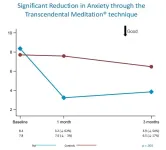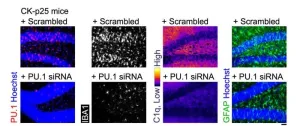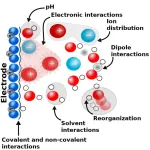(Press-News.org) Lymphatic fluid from surgical drains, which is usually tossed in the trash, is a treasure in the hands of University of Pittsburgh and Washington University School of Medicine in St. Louis researchers who found that this liquid could inform more precise treatments for patients with head and neck cancer caused by human papillomavirus (HPV).
The new study, published in Clinical Cancer Research, a journal of the American Association for Cancer Research, shows for the first time that HPV DNA in lymphatic fluid collected after surgery is a powerful biomarker that could predict risk of cancer recurrence and help clinicians decide whether to ramp up adjuvant therapies or safely de-escalate treatment for patients with HPV-positive head and neck cancer.
“Over the last decade, there has been emerging interest in liquid biopsy to pick up cancer recurrences after treatment,” said senior author José P. Zevallos, M.D., M.P.H., professor and Eugene N. Myers chair of the Department of Otolaryngology at the Pitt School of Medicine and UPMC Hillman Cancer Center. “Our goal was to bring liquid biopsy into the curative pathway for head and neck cancer so that we can use it not just to find recurrences but also to help make treatment decisions.”
Head and neck cancer once almost exclusively affected heavy drinkers and smokers, but the landscape of this disease has changed dramatically because of HPV, according to Zevallos. HPV-positive oropharyngeal squamous cell carcinoma (OPSCC) has now surpassed cervical cancer as the most common HPV-related malignancy and incidences are rising rapidly worldwide.
Up to 30% of head and neck cancer patients experience recurrences driven by hard-to-detect cancer cells that evade treatment. Liquid biopsies aim to detect telltale signs of lingering cancers by measuring biomarkers found in blood, urine and other body fluids. But Zevallos, a surgical oncologist, wondered if surgical lymphatic fluid could be more informative for head and neck cancer liquid biopsy.
“After surgery, patients typically have a surgical drain inserted to evacuate the lymphatic fluid that would otherwise build up under the skin and cause problems,” said Zevallos. “This fluid is usually thrown in the trash, but our study shows that it’s incredibly valuable. I love the concept of finding value in waste that has been overlooked.”
The new study, led by Zevallos and co-senior author Aadel Chaudhuri, M.D., Ph.D., assistant professor of radiation oncology at Washington University School of Medicine in St. Louis, focused on a cohort of more than 100 patients being treated for HPV-positive OPSCC.
After patients underwent surgical removal of their tumor, the team collected surgical lymphatic fluid 24 hours after surgery, and they also took blood samples for comparison. Then, they measured cell-free DNA, the genetic material that is no longer within a cell but rather floats freely in acellular fluid.
They found cell-free DNA from HPV (cf-HPV) in 78% of lymphatic fluid samples but just 12% of blood samples. Strikingly, cf-HPV levels were thousands of times higher in lymph than in blood, suggesting that this surgical waste can detect cancerous DNA with more sensitivity than blood.
After surgery, patients may need adjuvant radiation therapy with or without chemotherapy to clear remaining tumor cells. The gold standard that clinicians use to make this decision is surgical pathology, which involves visually inspecting lymph nodes and surgical margins for evidence of malignant cells.
Analysis of lymphatic fluid closely reflected this gold standard. The abundance of cf-HPV in lymphatic fluid was strongly linked with how many lymph nodes the cancer had spread to and its aggressiveness in those nodes. Likewise, patients with zero metastatic lymph nodes had no detectable cf-HPV.
While surgical pathology is informative, it can be subjective and may not always accurately reflect the aggressiveness of a cancer, according to Chaudhuri. This gap is where the new test truly shines.
For example, two patients in the study were deemed to have low risk of recurrence based on pathology results, so they did not receive adjuvant radiation therapy. They each went on to suffer cancer relapse within a year. While cf-HPV was not detected in blood, lymphatic fluid collected just 24 hours after surgery was positive for cf-HPV, suggesting that this test could detect high-risk patients who are missed by traditional tools.
“This test doesn’t just replicate what pathology tells us, it gives us more information,” said Chaudhuri. “We demonstrate that we can find aggressive cancers even when gold-standard pathology misses them. That’s what makes this test such a game changer.”
On the other hand, analysis of lymphatic fluid could potentially guide safe de-escalation of treatment in some patients. Three patients in the study who received adjuvant chemoradiation did not have detectable cf-HPV in their lymphatic fluid, suggesting they were at low risk of recurrence. The researchers speculate that less-aggressive adjuvant therapy could have been appropriate, but this needs further investigation.
“This test is about precision intensification and precision deintensification,” said Chaudhuri.
The team next developed a machine learning model to predict progression-free survival, or which patients will recur or remain disease-free, which included cf-HPV from both blood and lymphatic fluid as well as pathology data and other patient information. The model accurately identified low- and high-risk patients, and cf-HPV of lymphatic fluid was a very important aspect of the model.
“We can use a liquid taken just 24 hours after surgery to predict which patients will eventually relapse and which ones will remain recurrence-free,” said Zevallos. “This could be incredibly valuable for making treatment decisions in the clinic.”
The team is now working to validate and extend their findings, including the development of a lymphatic fluid-based test for HPV-negative head and neck cancer.
The lead author of the study was Noah Earland, an M.D.-Ph.D. student at the Washington University School of Medicine in St. Louis and a member of both Chaudhuri’s and Zevallos’s labs. Other authors were Nicholas P. Semenkovich, M.D., Ph.D., Ricardo J. Ramirez, M.D., Peter K. Harris, Ph.D., Andrew I. Hearn, Matthew Inkman, Ph.D., Jeffrey J. Szymanski, M.D., Ph.D., Benjamin M. Wahle, M.D., Kevin Chen, M.D., Irfan Alahi, M.S., Gabris Ni, Andrew Chen, and Jin Zhang, Ph.D., all of the Washington University School of Medicine in St. Louis; Sophie P. Gerndt, M.D., of Allegheny Health Network; Zhuosheng Gu, Damion Whitfield, Ph.D., and Wendy Winckler, Ph.D., all of Droplet Biosciences; and Zhongping Xu, Ph.D. of UPMC.
This research was supported by the National Cancer Institute (R01 CA211939), the National Cancer Institute (U2C CA252981), the National Institute of Deafness and Other Communication Disorders (T32DC000022), the Washington University Institute of Clinical and Translational Sciences (UL1TR002345) from the National Center for Advancing Translational Sciences, the V Foundation V Scholar Award, the Washington University Alvin J. Siteman Cancer Research Fund and the Medical Scientist Training Program at the Washington University School of Medicine.
END
Novel liquid biopsy of lymph fluid could guide precision treatment for head and neck cancer
2023-12-11
ELSE PRESS RELEASES FROM THIS DATE:
LOINC® and Health Data Standards receives $4.4 million grant to expand efforts to address health inequities in EHRs
2023-12-11
INDIANAPOLIS -- LOINC® and Health Data Standards at Regenstrief Institute has received a $4.4 million grant from the Regenstrief Foundation to support expansion of work on a global initiative to categorize and standardize social determinants of health (SDOH) information into electronic health records (EHRs), an ambitious project to integrate social needs data into clinical care to more effectively address health inequities.
The unequal distribution of income, food, safety and access to healthcare are recognized as root causes of health disparities. But, currently, data on these factors are rarely well documented within a patient’s ...
New study shows Transcendental Meditation significantly reduced PTSD and anxiety in frontline nurses during COVID-19 pandemic by more than half over a 3-month period
2023-12-11
Frontline nurses who learned the Transcendental Meditation® (TM®) technique during the COVID-19 pandemic showed rapid and significant improvements in flourishing, PTSD, anxiety, and burnout over 3 months compared to controls, according to a study published today in the Journal of Nursing Administration.
The objective of this study was to evaluate the impact of Transcendental Meditation on nurses’ multidimensional well-being, conceptualized as the presence of flourishing and the absence of PTSD, anxiety, and burnout.
A total of 104 nurses in three Florida hospitals participated. ...
New research identifies several warning signs that could predict intimate partner violence
2023-12-11
Intimate partner violence is widespread and can have severe physical and psychological health repercussions, but there is a shortage of research on reliable predictors of abuse before it occurs. New research, published in Social Psychological and Personality Science, identifies several warning signs that preceded and predicted intimate partner violence.
“Although future research is required to fully understand the associations between warning signs and abuse, these red flags could eventually be used ...
Just say no to that invitation
2023-12-11
It may feel unforgivably rude to reject an invitation – even one to an event you would much prefer not to attend – but people often overestimate the social consequences of saying no, according to research published by the American Psychological Association.
“I was once invited to an event that I absolutely did not want to attend, but I attended anyways because I was nervous that the person who invited me would be upset if I did not – and that appears to be a common experience,” said lead author Julian Givi, PhD, an assistant professor at West Virginia University. “Our research shows, however, ...
Researchers compare mental illness, gun violence rates in U.S., Australia and U.K.
2023-12-11
Considerable attention has focused on mental illness as a major contributor to homicides in the United States. Serious mental illness affects more than 14 million Americans ages 18 and older and nearly 58 million people reported having a mental illness.
In 2021, 47,286 Americans died from gun violence – the highest ever – of which 46 percent were homicides and 54 percent were suicides involving firearms.
Researchers from Florida Atlantic University’s Schmidt College of Medicine and collaborators compared deaths from mental illness and gun violence in the U.S., Australia and the United Kingdom and their clinical ...
Science sheds light on shaking your holiday presents
2023-12-11
As holidays near, people are sneaking shakes of their presents to try to figure out what they’re getting. But present shakers might be a little less sly than they think. New research shows it’s incredibly easy for people watching others shake boxes to tell what they’re up to.
“There are few things more delightful than seeing a child’s eyes light up as they pick up a present and wonder what might be inside,” said author Chaz Firestone, a Johns Hopkins University assistant professor of psychological and brain sciences who investigates ...
Nanoparticle-delivered RNA reduces neuroinflammation in lab tests
2023-12-11
Some Covid-19 vaccines safely and effectively used lipid nanoparticles (LNPs) to deliver messenger RNA to cells. A new MIT study shows that different nanoparticles could be used for a potential Alzheimer’s disease (AD) therapy. In tests in multiple mouse models and with cultured human cells, a newly tailored LNP formulation effectively delivered small interfering RNA (siRNA) to the brain’s microglia immune cells to suppress expression of a protein linked to excessive inflammation in Alzheimer’s ...
New insight on electrochemical reactions – advancing the green transition
2023-12-11
Electrochemical reactions are central to the green transitions. These reactions use the electric current and potential difference to carry out chemical reactions, which enables binding and realizing electric energy from chemical bonds. This chemistry is the basis for several applications, such as hydrogen technology, batteries, and various aspects of circular economy.
Developments and improvement in these technologies require detailed insight into the electrochemical reactions and different factors impacting them. Recent studies have shown that besides the electrode material also the used solvent, its acidity, and ...
New conductive, cotton-based fiber developed for smart textiles
2023-12-11
PULLMAN, Wash. – A single strand of fiber developed at Washington State University has the flexibility of cotton and the electric conductivity of a polymer, called polyaniline.
The newly developed material showed good potential for wearable e-textiles. The WSU researchers tested the fibers with a system that powered an LED light and another that sensed ammonia gas, detailing their findings in the journal Carbohydrate Polymers.
“We have one fiber in two sections: one section is the conventional cotton: flexible and strong enough for everyday use, and the other side is the conductive material,” said Hang Liu, WSU textile ...
New therapeutic target for rare type of childhood epilepsy
2023-12-11
Researchers at the Francis Crick Institute, UCL and MSD have identified a potential treatment target for a genetic type of epilepsy.
Developmental and epileptic encephalopathies are rare types of epilepsy which start in early childhood. One of the most common types of genetic epilepsy, CDKL5 deficiency disorder (CDD), causes seizures and impaired development. Children are currently treated with generic antiepileptic drugs, as there aren’t yet any disease-targeting medications for this disorder.
CDD involves losing the function of a gene producing the CDKL5 enzyme, which phosphorylates proteins, meaning it adds an extra phosphate ...







